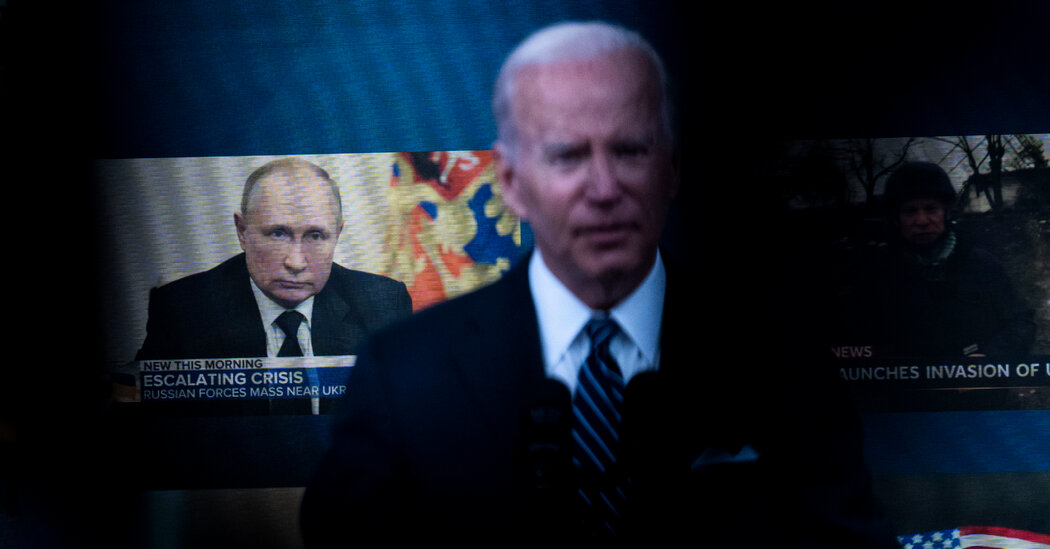
WASHINGTON — When President Biden met his Western allies in Europe three months ago, the world was rallying behind Ukraine, and NATO suddenly had a new sense of purpose — its old purpose, containing Russia. There was talk of “crippling sanctions.” President Vladimir V. Putin was in retreat, and talk of victory was in the air.
Mr. Biden returns to Europe on Saturday night at a moment when everything about the war is harder. While Russia’s oil exports have fallen precipitously, its revenues have actually been on the rise, a function of soaring fuel prices. After concentrating its efforts in Ukraine’s south and east, Russia is making incremental but significant gains, as the Ukrainians, surrounded, begin to give up key cities: first Mariupol, and now, in the east, Sievierodonetsk.
So Mr. Biden must prepare his allies for a grinding conflict — a return to the “long, twilight struggle” that President John F. Kennedy talked about during the Cold War — amid shocks in the food and energy markets, and inflation on a scale few imagined six months ago. Not surprisingly, a few cracks are already emerging, as popular discontent, and coming elections, begin to worry allied leaders.
White House officials say that none of this will deter Mr. Biden from squeezing Russia even harder, and the past few weeks have included behind-the-scenes efforts to reach agreements on new ways to isolate Moscow.
John F. Kirby, the former Pentagon spokesman who has moved to the White House to coordinate the messaging on Mr. Biden’s war objectives, told reporters on Thursday to expect new measures to “target the Russian defense supply chain and continue cracking down on the evasion of these unprecedented sanctions” — seemingly a warning to China and India, which have continued to buy discounted Russian oil.
Mr. Kirby argued that Moscow was beginning to hurt, four months into the war. “Because of our actions, Russia is struggling to make bond payments, edging closer to default,” he said. “And our measures will only tighten the screws and restrict revenue Mr. Putin needs to fund this war.”
The White House is also planning to announce new steps to bolster NATO’s capabilities, including a new “strategic concept” for the alliance, the first in a dozen years. Back then, there was still talk of integrating Russia into Europe; today that seems fanciful.
Chief among the concrete steps will be the creation of a new “cyber rapid reaction” force that can step in to help defend NATO members — and Sweden and Finland, the two countries with applications pending — against stepped up cyberattacks intended to intimidate them. Similar commitments have been announced before, but Anne Neuberger, the president’s deputy national security adviser for cyber and emerging technologies, said in an interview that NATO needed to draw on the expertise and intelligence gathering of its most skilled operators in cyberconflict.
“We’ve recognized the need for a virtual capability to respond rapidly to an incident if an ally experiences a significant cyberattack and asks for support,” Ms. Neuberger said on Friday. “It really reflects the lessons learned from the Russia-Ukraine scenario — which is that if you prepare in advance, and exercise in advance, you know how to rapidly respond.”
Better Understand the Russia-Ukraine War
But the looming issue will be how to deal with Mr. Putin, at a moment Russia has been recast from a fellow European power to a pariah state. His isolation will deepen, American officials say. But when France’s president, Emmanuel Macron, said in May that the West should resist “the temptation of humiliation” of Mr. Putin, it was among the first public signs of a rift in the fundamental strategy of how far to push the Russian leader, short of sending NATO troops into the fight — a step that Mr. Biden and other NATO leaders say they have no intention of taking.
“Compared to the March trip, Biden faces a heightened degree of trade-offs between domestic and foreign policy objectives,” said Richard Fontaine, the chief executive of the Center for a New American Security, a Washington research group. “His priority will be to increase pressure on Russia and aid to Ukraine, but to do so when the West is worried about oil and food prices, its remaining weapons stocks and a war that shows no end in sight.”
For now, Mr. Biden is under little political pressure at home to back away. Most of the debates about how much to turn up the heat on Mr. Putin, without provoking a major escalation in the war, take place behind closed doors among his staff.
But there is concern that rising gas prices and the cost of keeping Ukraine armed and fed will begin to wear down enthusiasm, especially if Mr. Putin makes good on recent threats to limit gas supplies to Europe in the fall. Mr. Fontaine noted: “All the leaders he’ll meet are in the same general dilemma, and elections loom in the United States and elsewhere. Western unity is high, support for Ukraine still very solid and the desire to resist Russia real.”
But he also said that summit meetings “demonstrate how sustainable the various lines of effort will be as the war itself grinds away.”
It is the new, grinding nature of the conflict that differentiates these two summits — a meeting of the Group of 7, a gathering of the world’s wealthiest large democracies, at Schloss Elmau in Germany and then NATO, beginning Wednesday in Madrid — from those that have gone before.
Only two months ago, Americans were talking openly about victory over the Russians, and the reasonable-sounding hope that Mr. Putin’s forces would be forced to retreat to the positions they held before the Feb. 24 invasion. At the end of his last speech on that trip, in Warsaw, after visiting refugees who had fled across the border to Poland, Mr. Biden uttered this about Mr. Putin: “For God’s sake, this man cannot remain in power.”
White House aides immediately said the United States was not seeking to engineer regime change, just as they scrambled a month later when Defense Secretary Lloyd J. Austin III, speaking accurately if too bluntly about America’s strategic objectives, said, “We want to see Russia weakened to the degree that it can’t do the kinds of things that it has done in invading Ukraine.”
Mr. Biden is now more cautious in his public tone, even if his goals remain fundamentally unchanged. The question is whether he can begin to move allies from a crisis response to a sustained response to the invasion, knowing that expenses will mount and pressure will build as Mr. Putin tries to use every weapon at his disposal — like limiting gas exports and continuing to block Ukrainian grain exports — to exercise leverage over his adversaries.
“It is only natural that people and governments lose interest in conflicts as they drag on,” Dmytro Kuleba, Ukraine’s foreign minister, wrote in Foreign Affairs this month. “The world stopped paying attention to the war in Libya” after Col. Muammar el-Qaddafi fell, he added later, and “disengaged from Syria, Yemen and other ongoing conflicts that once generated front-page news.” The same happened after Russia’s annexation of Crimea, he said.
“Compromising with Russia may seem tempting to some abroad, especially as the costs of the war grow,” he concluded, saying the only path was “a complete and total Ukrainian victory.”
In public, all will agree. Though Mr. Biden will not say much about it during the summits, the debate within his own administration about what to send and what to keep at home replays each week in the Situation Room.
Mr. Biden, aides say, is constantly weighing whether new weapons — like the advanced artillery that just arrived on the battlefield or the advanced drones that the White House is now considering sending — would escalate the war too fast and give Mr. Putin another justification for retaliation. But he also wants to make sure that Mr. Putin is losing ground.
Hovering over the two meetings will be this perilous moment for the global economy. Inflation has flared across the United States and Europe, driven by the supply-chain disruptions of the Covid-19 pandemic; a surge of consumer demand as economies have reopened; and, in recent months, a spike in food and energy prices caused by the Russian invasion. Rapid price increases have hurt workers and families across the Group of 7 nations and eroded their leaders’ standing in the polls — particularly Mr. Biden’s.
For all their calls for unity, the leaders will be hard-pressed to find quick and concrete ways that they can work together to help relieve that economic and political pain. They are set to discuss infrastructure investment and other ways to unsnarl global supply chains; new steps to counter trade practices by China that American leaders and others call predatory; and a range of issues surrounding inflation. But all fear that interest rate increases could be a prelude to a recession.
Perhaps most urgently for Mr. Biden, the leaders are expected to discuss ways to bring down global oil prices — and with them, prices for drivers at the gasoline pump — including possible changes to how European nations have sought to hurt Russia’s oil export business.
The leaders are also expected to spend significant time discussing global agriculture and how to increase the world’s food supply, as the war cuts off access to critical sources of nourishment for rich and poor countries alike. So far, Biden administration efforts to find a pathway out of Ukraine for its farm products have failed. Russia is doing what it can to tighten the noose, in what appears to be an effort to bring President Volodymyr Zelensky’s country to economic collapse.
For the European allies, keeping Ukraine afloat, while containing Russia, is a mission that was barely discussed when the allies met a year ago. “Russia’s invasion of Ukraine underscores a central challenge for U.S. engagement with core allies and partners,” said Ali Wyne, the author of “America’s Great-Power Opportunity,” a new book examining the changing nature of great-power competition.
He defined Mr. Biden’s challenge as “translating short-term unity borne of reactive shock into enduring cohesion, borne of affirmative purposes.”
Jim Tankersley contributed reporting from Innsbruck, Austria.




